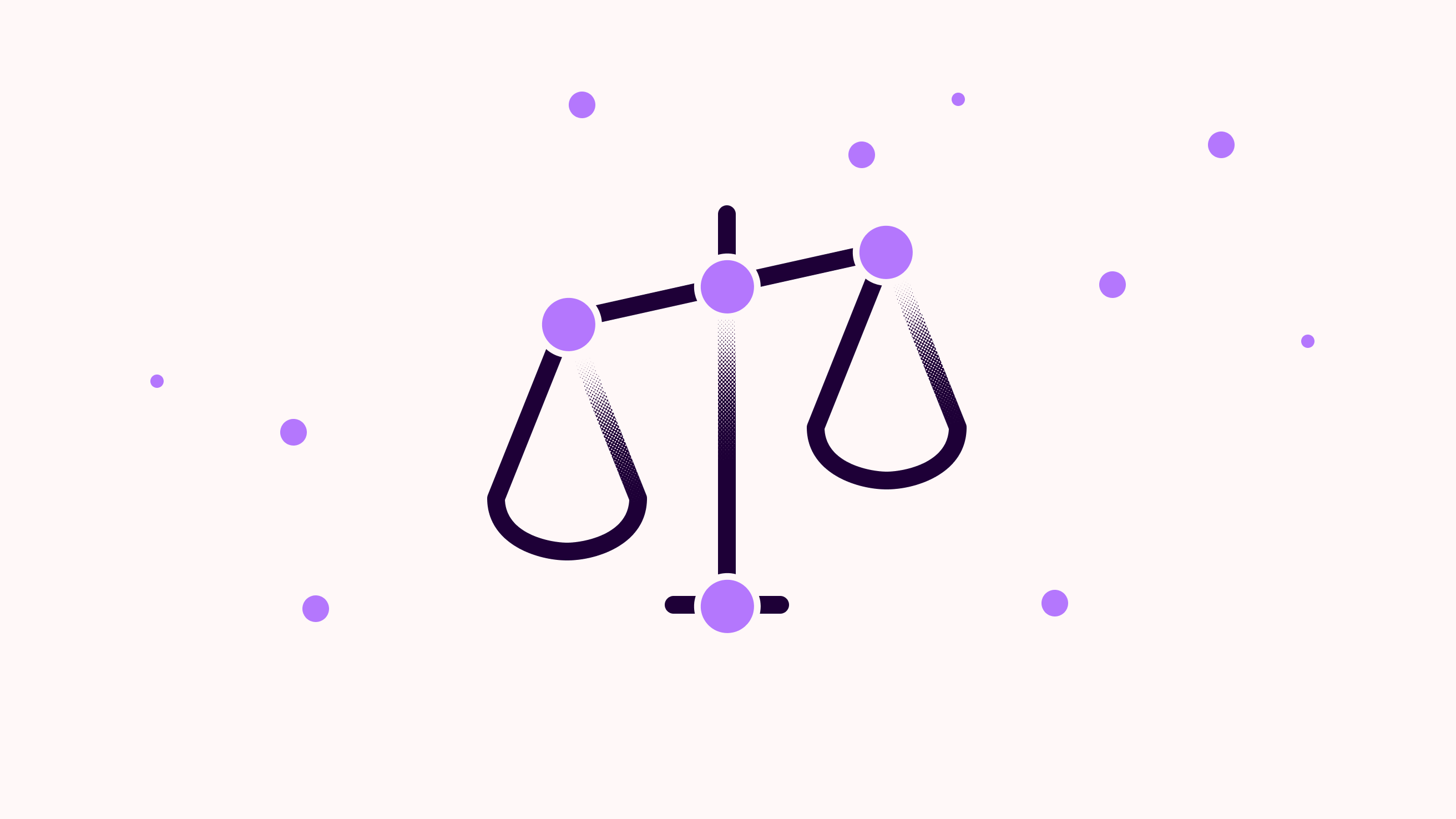Work ethic in the workplace
Discover work ethic definition, examples of strong and bad work ethics. Why it is important in the workplace. Learn how to improve your work ethic.

In this article, you’ll learn what defines a strong work ethic, and how to develop it within your company.
You’ll also learn what affects the work ethic of various personnel, and how you can help them improve it.
Discover:
- What is work ethic?
- Why is work ethic important?
- What are the benefits of having a strong work ethic in an organization?
- Work ethic examples
- Strong and poor work ethic skills and traits
- How to develop a strong work ethic in an organization (tips)
- FAQ about work ethic
What is work ethic?
Work ethic is a set of standards of behavior and beliefs regarding what is and isn’t acceptable to do at work.
Work ethic can be strong (good) or poor (bad), it depends on personal views of employees, their motivation, and overall company culture.
A strong work ethic is an attitude an employee applies to their work that indicates a high level of passion for any work they do.
A bad work ethic is an attitude that an employee demonstrates that shows a lack of ambition and professionalism in the workplace.
People with a strong work ethic often seem as though they have a competitive spirit, although their competitiveness is often within themselves to achieve their goals within their occupation.
Those individuals with a strong work ethic often present themselves as ‘ideal employees’ because their drive for success leads them to work to achieve one goal after another.
Work ethic can be nurtured, although it’s often a part of an individual’s character and overall outlook on life.
Why is work ethic important?
Work ethic may seem like a subjective topic, but for human resources departments, knowing what it is and how it works is important.
A strong work ethic within the company serves as a behavioral model for the right way of working. It supports and fosters a productive working culture.
Employees with a strong work ethic are highly driven and often far exceed their peers in terms of achieving company goals.
They lead by example and motivate others to work hard. Of course, it must be part of the work culture, and everybody should support it.
Otherwise, one employee with a strong work ethic in a collective of people with poor work ethic will eventually exhibit the same attitude or will leave the company.
Bad work ethic, put another way, can lead to demotivation, loss of effectiveness, sometimes even to high turnover rate and other damaging consequences.
So, it is vital for the HR department to track and adjust work ethic within the company, department, or even of the particular employee.
We won’t say that employees with a strong work ethic are better choices for promotion within the company, but they are the first candidates for this, because of their drive and commitment to their job.

Build a learning culture: a practical workbook for your organization
Upgrade your organization’s learning culture with clear, actionable strategies to address the challenges.
Download workbookWhat are the benefits of having a strong work ethic in an organization?
Employees are more productive and dedicated. They help each other, and so on. Cover this more.
1. A balanced, respectful workplace and culture
Employees with a strong work ethic present themselves as professionals in every sense of the word.
They respect their fellow employees, their higher-ups, and those that they come into contact with.
Not only does this present a polished image for your organization, it also creates an environment that other people are happy to work in.
2. Higher productivity
Employees with a strong ethic put their commitments to the company before other, frivolous activities.
While there’s no reason to work rather than attend to a family emergency, these employees won’t slack off on a project because they’d rather do something they’re not obligated to instead.
A high drive for work ethic means that they take enough gratification in their job to complete every task, and correctly prioritize their work/life balance.
People with a strong work ethic take pride in their jobs and see every task they do as important.
These are employees that rarely, if ever, arrive at the job late. Not only that, they complete all assigned projects in a timely manner and avoid holding up the workflow of the rest of the organization. This creates efficiency and a sense of expediency in the workplace.
3. A wider talent pool
The employees that show the highest work ethic are also those that continue their dedication as they advance in their careers. Better managers make for better employees underneath them.
When you scout employees with a strong work ethic from the beginning, you can keep your strongest assets within the company.
Work ethic examples
Next, we’ll go into a practical examination of work ethic. We’ll review some common examples of both strong and poor work ethic.
Strong work ethic examples
People with a strong work ethic are often referred to as true professionals. Next, we’ll look at some examples of a strong work ethic in the workplace.
First example:
Barney is the employee that always follows through on his commitments. If he agrees to take over another co-worker’s shift, he always shows up. If commits to a deadline, you can count on him to meet that deadline.
Everyone knows him as the guy they can rely on. He gets satisfaction in being the person that never shows up late, and always completes work of the caliber, no matter what the task is.
Second example:
Angela’s supervisor asked her to coordinate reports between patient in-services and insurance. Unfortunately, Angela isn’t very familiar with processing certain insurance claims.
Rather than giving up, Angela decides to expand her skillset. She networks with her co-workers in the insurance department and asks questions of her supervisor to ensure she completes her task to the best of her ability.
In the process, she expands her skills to make sure she meets her goals.
Third example:
Barbara is known for her meticulous work. She never misses a deadline, and still doesn’t sacrifice the quality of her work to do so.
While it may take more focus, and time for certain tasks, she always delivers high-quality, reliable work. Her supervisors know that they don’t need to double-check her work.
No matter what day, what time, or what the circumstances are Barbara never turns in work that would be considered sub-par.
Bad work ethic examples
Individuals with bad work ethic aren’t very hard to point out. However, clear examples can help you point out specific factors that are a problem. If these are corrected, the employee’s performance will also improve.
First example:
Jim’s supervisor asked him to review the financial reports from last quarter to look for purchases from one client. The supervisor gave him this task about a month ago and asked him to complete it within a few weeks.
Now, a month has passed, and Jim still hasn’t reviewed any of the reports. Rather than starting early, he’s left it to the last minute and turns in an incomplete report.
Jim is a standard example of poor prioritization and a weak work ethic.
Second example:
Sheila is sometimes bothered by the tasks required of her. However, she never addresses this with her superiors. Instead, she complains to co-workers, friends, and anyone that will listen about her job.
Ultimately it displays a very poor image of the company and creates a more hostile working environment for her co-workers.
Being resentful and complaining, rather than seeking solutions, is another strong indicator of poor work ethic.
Third example:
Jeff is an employee that isn’t bothered by work schedules. Every weekday he’s supposed to show up at 9 am.
While other employees show up on time or even early, Jeff is rarely, if ever at the office on time. He makes excuses about traffic or other problems but never bothers to get up earlier to correct the issues.
His constant tardiness shows a lack of respect for his job and fellow coworkers. His coworkers know him as unreliable and irresponsible as a result.
Repeated tardiness is another common sign that an employee has a bad work ethic.

Build a learning culture: a practical workbook for your organization
Upgrade your organization’s learning culture with clear, actionable strategies to address the challenges.
Download workbookStrong and poor work ethic skills and traits
Next, we’ll go into a practical examination of work ethic. We’ll review some common examples of both good and bad work ethic.
Strong work ethic skills you should develop
Hard work
Hard workers don’t give up when a task is difficult. These individuals show their work ethic in their persistence.
Dedication
Dedication means that an employee always sees their commitments through. They keep their deadlines and complete tasks to the fullest.
Discipline
Workers that show discipline aren’t swayed by what they want to do. Instead, they continue doing what they should until it’s complete.
Productivity
Individuals with a strong work ethic often have high productivity and keep themselves busy completing assignments and meeting their goals.
Teamwork
Team players are individuals that demonstrate work ethic through teamwork. They know their company works when everyone does their part, and they’re always willing to help a co-worker.
Integrity
Integrity is a strong indicator of a good work ethic. It guides individuals to make choices that are morally sound, and that are ethically balanced.
Responsibility
Individuals with a strong work ethic are known to be responsible. Being consistent and reliable shows professionalism and respect for their work.
Determination
Employees can show a strong work ethic by being determined to meet or exceed goals. Even if they’re not familiar with the task, they will look for resources to help them successfully achieve their goals.
Professionalism
It can be difficult to do the best work on the hardest days; however, individuals with a strong work ethic persevere and create high-quality work nonetheless.
Bad work ethic skills you should avoid
Procrastination
People with poor work ethic aren’t driven to complete tasks. As a result, they wait until the last minute to complete work and often produce work of poor quality.
Negativity
Negativity affects others in the workplace and is a common trait of people with bad work ethic because they don’t value professionalism.
Toxicity
Toxicity is a high indication of poor work ethic. These individuals aren’t concerned with creating a productive, welcoming work environment and seek to minimize their peers.
Inefficiency
Employees with poor work ethic may demonstrate inefficiency. While they may complete their tasks, they do it in a way that ultimately takes more time, and costs the company more money.
Irresponsibility
When you have an irresponsible employee, you can see a lack of work ethic in how seriously they take their duties in the workplace. Irresponsible employees don’t place high importance on their commitments and responsibilities.
Passiveness
Passiveness can be a general personality characteristic, but it can also apply to attitudes in the workplace. This attitude means that individuals don’t care either way what happens with their job- in other words, they also demonstrate apathy.
Untimeliness
People with a poor work ethic aren’t driven to go to work, nor are they driven to complete projects as part of their job.
Unprofessional behavior
Unprofessional behavior is a strong indicator of a lack of work ethic, as those employees that take pride in their jobs strive to maintain a professional demeanor.
How to develop a strong work ethic in an organization (tips)
Next, this list will give you the best tips available for developing a strong work ethic within your company.
1. Lead by example
People look to their leaders for the behaviors they should emulate. Supervisors and the HR department are perfect examples of this.
Show employees the value of a strong work ethic by embodying it yourself, and encouraging supervisors in all departments to do the same.
2. Organize team workshops
Employees tend to be more motivated when they work as a team, and learning skills for their job is no different.
Allowing everyone to work together in a team workshop breeds a more positive environment in the office, and often gives individuals an extra reason to try and excel at learning a new skill.
3. Organize feedback sessions (discussions)
Getting feedback helps you know how employees feel about the company.
You can choose to do individual interviews, group discussions, or even anonymous surveys. The most important part is to get honest, unfiltered feedback.
This feedback can tell you if there’s a general lack of work ethic in the company as a whole, in certain departments, or if certain individuals diminish work ethic.
4. Team building activities
People work harder when they feel like part of a team, and they don’t want to let their teammates down.
Use team-building activities to build rapport between employees, and grow their skills for teamwork.
Working as a team player is an important skill for developing an attitude of a strong work ethic.
5. 1-on-1 meetings to improve attitude
Address problems within your company as soon as possible- but keep it professional.
Don’t try to confront an employee in front of their peers, which can cause embarrassment, and lower morale and motivation. Instead, if you find an individual with problematic attitudes or behaviors, pull them aside for individual meetings.
Try to understand any issues they feel are causing the problem, and help coach them into better work behavior.
6. Encourage mentoring
One way to help enhance work ethic is by giving employees time to learn from a more experienced employee with a strong work ethic.
Mentors understand what less experienced employees deal with, and issues that might cause a negative attitude.
Set aside time and select mentors to be available to ‘coach’ other employees, and ultimately enhance their performance.
7. Keep a professional demeanor
Professionalism is a cornerstone of a strong work ethic.
Remember, a strong work ethic shows that you have great pride in the work you do, and a strong drive to continually succeed.
That also means that you see yourself as part of the team, and want to represent yourself, your coworkers, and your place of work to the very best. You never act in a way that creates a hostile or uncomfortable environment for your peers- you’re too busy trying to achieve your next goal.
Likewise, you don’t create conflict, and address everyone else within the company with the same respect you feel you deserve. You keep a clean-cut, professional appearance that shows you care about how you represent yourself and the company.
FAQ about work ethic
What does work ethic mean?
Work ethic represents a set of ethical attitudes towards work that regulates employees’ behavior at work.
What is a strong work ethic?
A strong work ethic refers to an outlook that compels people to succeed within their jobs.
How to develop a strong work ethic?
Create an atmosphere of mutual respect and professionalism among employees. Encourage employees to think of themselves as team players.
How to improve work ethic?
Maintain a professional attitude even in difficult circumstances. Remember that you’re part of a team, and that team needs all players to succeed. If possible, find a mentor (such as a more experienced employee at your company) to help guide you.
What are important skills of strong work ethics?
The most important skills for a strong work ethic include:
- Hard work
- Dedication
- Discipline
- Productivity
- Teamwork
- Integrity
- Responsibility
- Determination
- Professionalism
How to describe your work ethic?
Highlight positive traits about yourself that show your work ethic. Make these traits specific to you and your attitude. Avoid simply listing skills or traits; instead, try to connect them with job experience or examples.
How do you complete your work? Are you: timely, reliable, professional, or driven? Do you: always arrive on time, consistently complete quality work, support your team members?
Use these traits to build your answer, and make sure you can give relevant examples for each.
What is the protestant work ethic?
The Protestant work ethic is a theory applied to many different subjects, including sociology, theology, and other related studies. You may also hear ‘Protestant work ethic’ referred to Puritan or Calvinist work ethic, although the principles are the same.
In essence, this theory says that people are influenced by the values in their Protestant faith, and tend to demonstrate a more frugal lifestyle, discipline, and diligence in their everyday lives.
What is poor work ethics?
Poor work ethic shows when employees demonstrate bad work habits, including a lack of productivity, lack of concern for deadlines, and poor quality of work. In general, poor work ethics are an overall disregard for the job and professionalism.

Build a learning culture: a practical workbook for your organization
Upgrade your organization’s learning culture with clear, actionable strategies to address the challenges.
Download workbook



